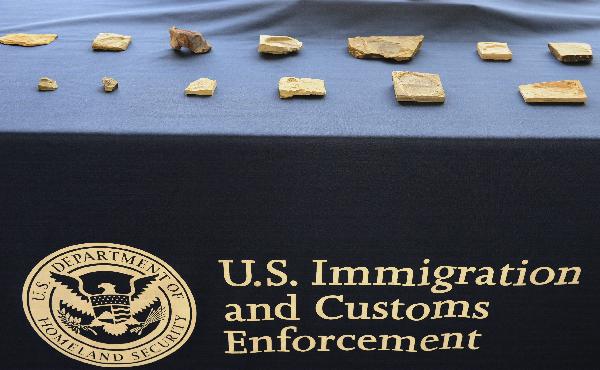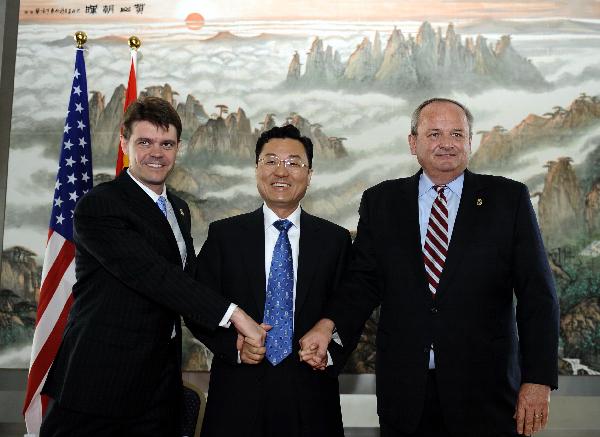US returns pre-historic fossils to China
|
|
|
The pre-historic fossils are displayed during the hand-over ceremony in Washington, capital of the United States, May 26, 2010. The U.S. government Wednesday returned some priceless pre-historic fossils to China as a result of two countries' cooperation on the fight against transnational crimes. [Jiang Guopeng/Xinhua] |
The U.S. government Wednesday returned some priceless pre-historic fossils to China as a result of the two countries' enhanced law enforcement cooperation.
At a ceremony at the Chinese Embassy, U.S. Immigration and Customs Enforcement (ICE) and U.S. Customs and Border Protection (CBP), on behalf of the U.S. government, returned the fossils seized during routine inspections of goods coming into the country.
Xie Feng, charge d'affaires of the Chinese Embassy, expressed his heartfelt gratitude to the U.S. government for its efforts to return the fossils to China.
"In recent years, our two countries have conducted effective and productive law enforcement cooperation. Both sides are committed to working more closely on this front, including evidence and information sharing, joint investigation, combating illegal immigration and transnational crimes," said Xie.
"We could say proudly that law enforcement cooperation has become a bright spot in our overall relations. And today's ceremony is another example of how far we have come in this field, " he added.
|
|
|
John Morton (L), Department of Homeland Security (DHS) Assistant Secretary for U.S. Immigration and Customs Enforcement (ICE), Xie Feng (C), Deputy Chief of Mission of the Chinese Embassy, and a U.S. Customs and Border Protection (CBP) official attend the pre-historic fossils hand-over ceremony in Washington, capital of the United States, May 26, 2010. The U.S. government Wednesday returned some priceless pre-historic fossils to China as a result of two countries' cooperation on the fight against transnational crimes. [Jiang Guopeng/Xinhua] |
This is the second repatriation of pre-historic fossils to China since September last year, when fossils of pre-historic mammals and dinosaur eggs which are 100-million-year old were returned to China.
The new collection of fossils to be sent back to China represent a much longer history than the fossils returned last year. According to the Curator of the Chicago Field Museum, these fossils are approximately 525 million years old.
This collection of fossils "represents centuries upon centuries of the life of the area we know as China. Though they are not expensive in terms of fossil trade, they are priceless to the scientific community," said John Morton, Department of Homeland Security (DHS) Assistant Secretary for ICE.
"ICE is concerned that our customs laws were ignored in the trading of protected artifacts that carry clues to China's past. Though our investigation is ongoing, these artifacts are headed home, where Chinese scientists will have the opportunity to study them."
 0
0 









Go to Forum >>0 Comments